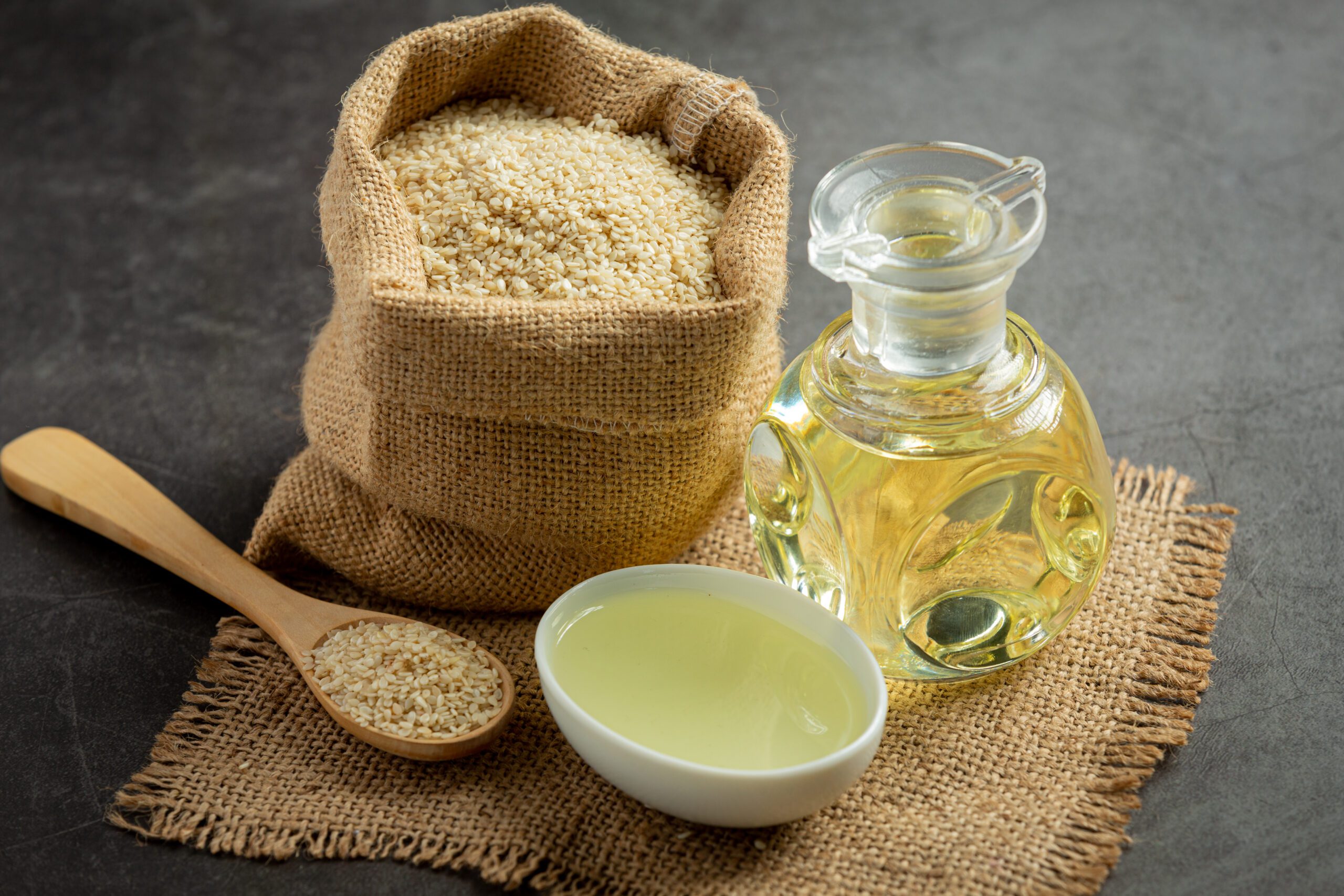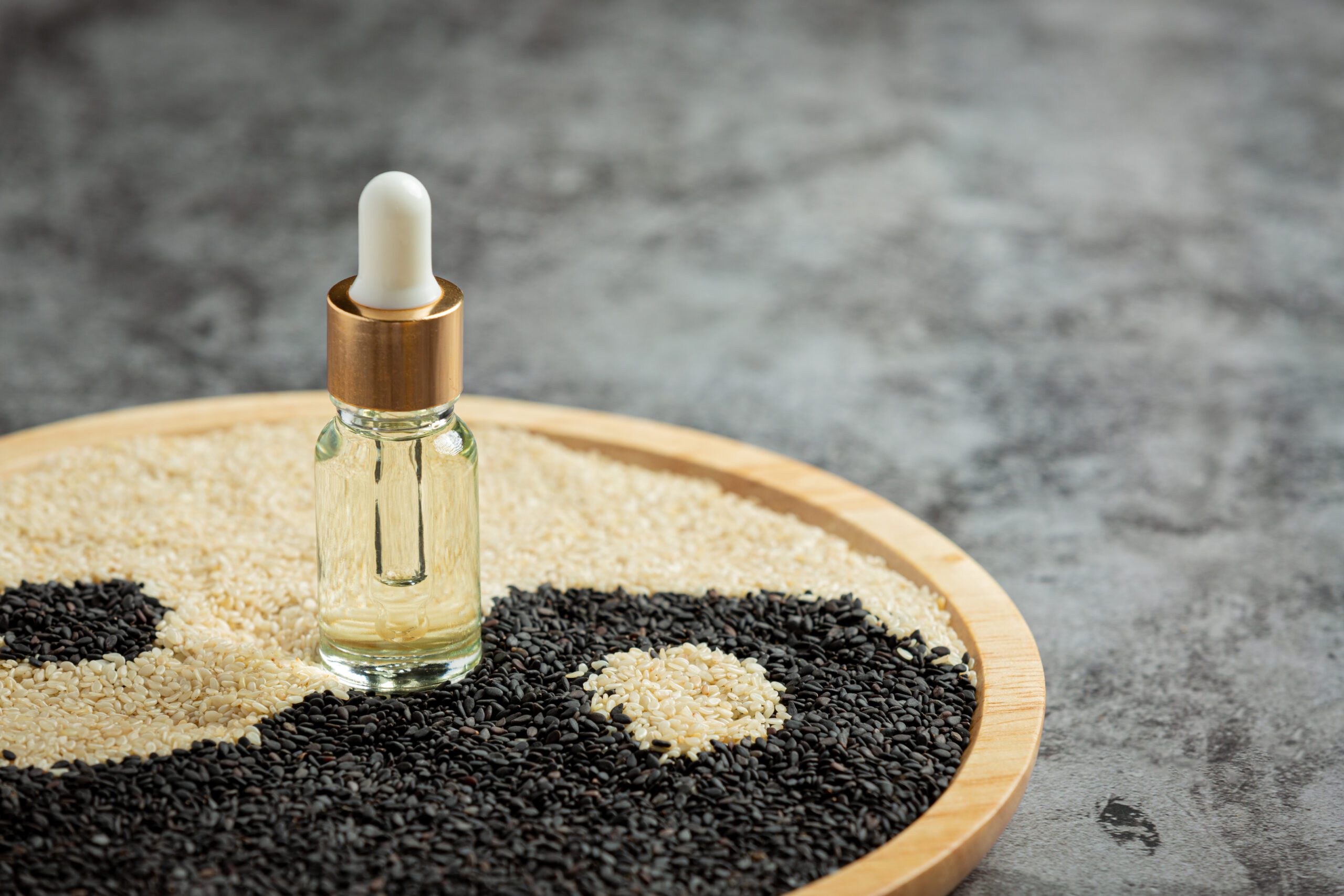Introduction To Sesame Oil
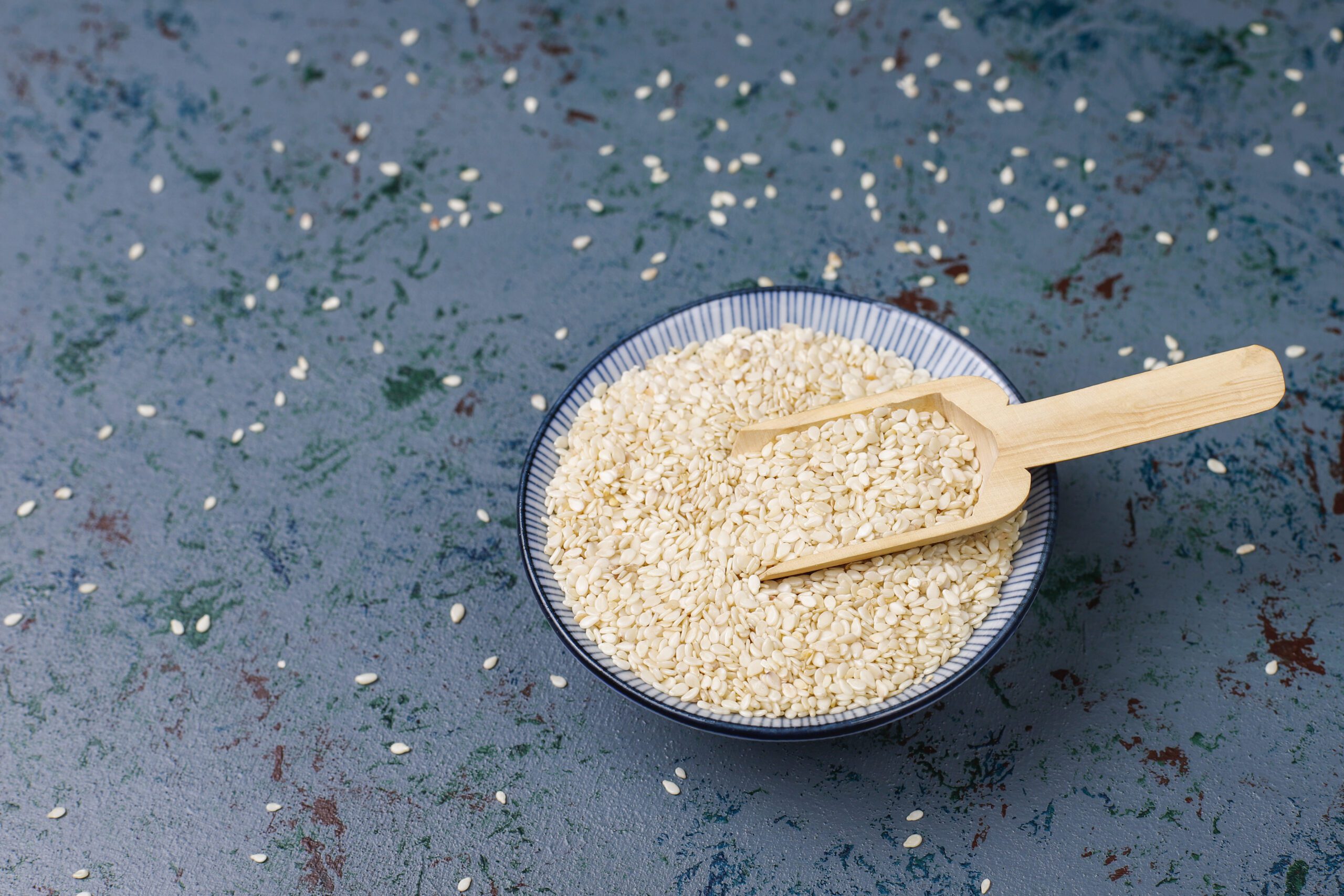
Sesame oil, got from the little sesame seeds of the Sesamum indicum plant, has for some time been adored for its adaptability, dietary wealth, and remedial properties. With a set of experiences going back millennia, sesame oil holds an extraordinary spot in customary medication, culinary expressions, and social ceremonies across different developments.
In this article, we embark on a journey to unlock the healing power of sesame oil, investigating its beginnings, dietary structure, medical advantages, culinary purposes, Ayurvedic applications, skincare benefits, and social importance. From ancient Ayurvedic texts to current logical exploration, sesame oil keeps on enamoring psyches and bodies with its myriad of virtue.
History And Origin Of Sesame Oil
-
Detoxification:
Sesame oil is sometimes used in Ayurvedic detoxification therapies like Panchakarma. It is used in procedures such as Shirodhara (oil pouring on the forehead) and Basti (enema therapy) to promote detoxification and rejuvenation.
Nutritional Composition Of Sesame Oil
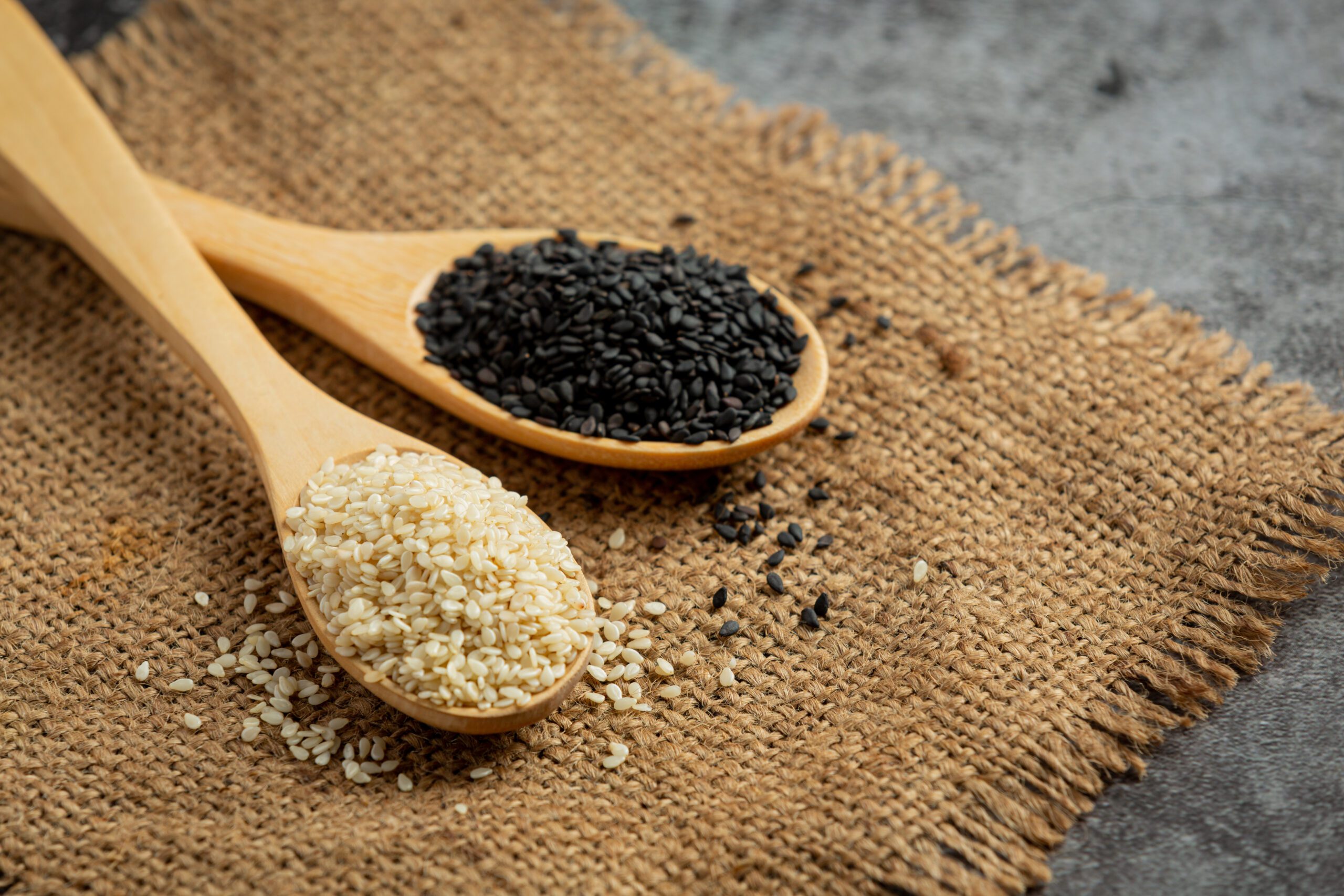
Sesame oil is famous for its rich wholesome profile, making it an important expansion to both culinary and therapeutic practices.
Here is a breakdown of the dietary piece of sesame oil:
-
Healthy Fats:
Sesame oil is predominantly composed of healthy fats, with approximately 40% to 50% monounsaturated fats, primarily oleic acid, and around 40% to 45% polyunsaturated fats, including linoleic acid and small amounts of alpha-linolenic acid (ALA). These fats are beneficial for heart health and overall well-being.
-
Vitamins:
Sesame oil is a good source of fat-soluble vitamins, particularly vitamin E (tocopherol). Vitamin E is a potent antioxidant that helps protect cells from oxidative damage, supports skin health, and contributes to overall immunity.
-
Minerals:
Sesame oil contains essential minerals such as calcium, magnesium, phosphorus, potassium, and trace amounts of iron, zinc, and copper. These minerals play vital roles in bone health, nerve function, muscle contractions, and maintaining electrolyte balance.
-
Antioxidants:
Sesame oil is rich in antioxidants, including sesamin, sesamol, and sesamolin. These antioxidants help neutralize free radicals, reduce inflammation, and protect cells from oxidative stress, thus contributing to anti-aging and disease prevention benefits.
-
Phytosterols:
Sesame oil contains phytosterols, plant compounds with cholesterol-lowering properties. Phytosterols help inhibit the absorption of cholesterol in the intestines, promoting heart health and reducing the risk of cardiovascular diseases.
-
Protein and Fiber:
While sesame oil is not a significant source of protein or fiber compared to whole sesame seeds, it still contains trace amounts of protein and dietary fiber, which contribute to satiety and digestive health.
-
Different Supplements:
Sesame oil additionally contains lignans, phytochemicals with potential medical advantages, and modest quantities of sugars and water.
Health Benefits Of Sesame Oil
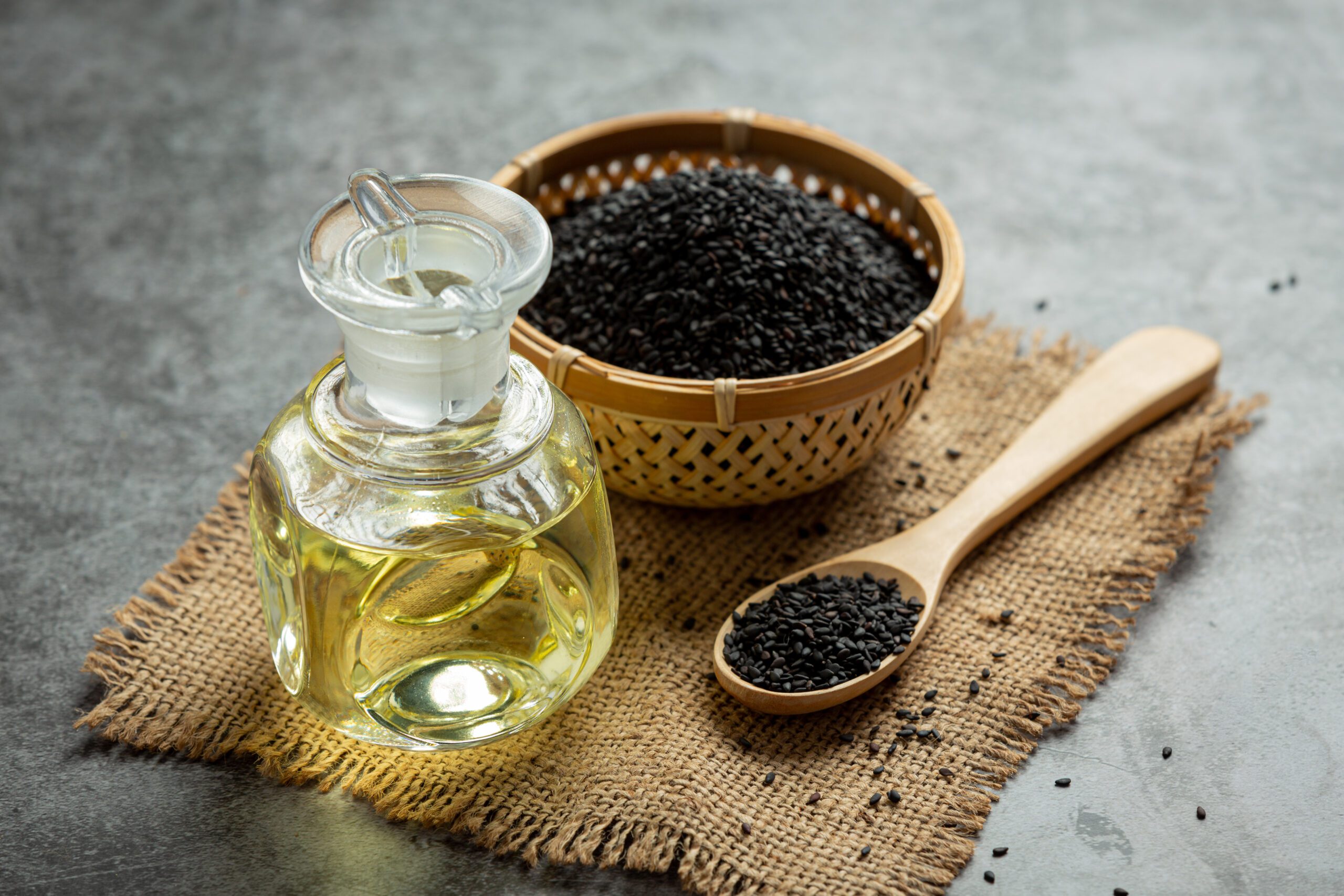
Sesame oil offers a plenty of medical advantages, because of its rich nourishing structure and remedial properties.
The Health benefits of Sesame oil are discussed below:
- Heart Health
- Antioxidant Protection
- Anti-inflammatory Properties
- Bone Health
- Digestive Health
- Immune Support
- Diabetes Management
- Cognitive Health
- Hormonal Changes
-
Heart Health:
The monounsaturated and polyunsaturated fats in sesame oil, particularly oleic acid and linoleic acid, help lower LDL cholesterol levels (bad cholesterol) while maintaining or increasing HDL cholesterol levels (good cholesterol). This balance supports cardiovascular health and reduces the risk of heart disease, stroke, and atherosclerosis.
-
Antioxidant Protection:
Sesame oil is rich in antioxidants, including vitamin E, sesamin, sesamol, and sesamolin. These antioxidants neutralize free radicals, reduce oxidative stress, and protect cells from damage. Regular consumption of sesame oil contributes to overall antioxidant protection and anti-aging benefits.
-
Anti-inflammatory Properties:
Sesame oil contains compounds like sesaminol and sesamol, which exhibit anti-inflammatory effects. These properties help reduce inflammation in the body, alleviate joint pain, and improve conditions such as arthritis, rheumatism, and inflammatory skin disorders.
-
Bone Health:
The calcium, magnesium, phosphorus, and vitamin K found in sesame oil support bone health and strength. Regular consumption of sesame oil helps prevent osteoporosis, strengthens bones, and promotes proper bone mineralization.
-
Digestive Health:
Sesame oil stimulates the digestive system and enhances nutrient absorption. It aids in relieving constipation, promoting regular bowel movements, and soothing digestive discomfort. Consuming sesame oil in moderation supports a healthy digestive tract.
-
Immune Support:
Sesame oil’s antioxidant and anti-inflammatory properties contribute to immune system support. By reducing oxidative stress and inflammation, sesame oil helps strengthen the immune response, defend against infections, and promote overall immune health.
-
Diabetes Management:
Sesame oil has been studied for its potential to improve insulin sensitivity and regulate blood sugar levels. Its low glycemic index and beneficial fats make it a suitable oil for individuals with diabetes or insulin resistance.
-
Cognitive Health:
The antioxidants and healthy fats in sesame oil support brain health and cognitive function. Regular consumption may help protect against age-related cognitive decline, enhance memory, and improve overall mental well-being.
-
Hormonal Balance:
Sesame oil’s phytosterols and phytoestrogens may contribute to hormonal balance in the body, particularly in women experiencing menopausal symptoms or hormonal fluctuations.
Culinary Uses Of Sesame Oil
Sesame oil is a versatile and delightful oil that adds a particular nutty smell and taste to many culinary manifestations.
Here are a few well known culinary purposes of sesame oil:
- Stir-Fries
- Marinades and Dressings
- Dipping Sauces
- Flavour Enhancement
- Baking and Dessert
-
Stir-Fries:
Sesame oil is a staple in Asian cuisine, particularly in stir-fries. Its high smoke point makes it suitable for high-heat cooking methods. Add a splash of sesame oil to the wok or pan when stir-frying vegetables, tofu, meat, or seafood for a rich, savory flavor.
-
Marinades and Dressings:
Sesame oil is a key ingredient in marinades and salad dressings. Combine sesame oil with soy sauce, ginger, garlic, and other seasonings to create a flavorful marinade for grilled meats, chicken, or vegetables. For dressings, mix sesame oil with vinegar, citrus juice, honey, and herbs for a delicious Asian-inspired salad dressing.
-
Dipping Sauces:
Mix sesame oil with soy sauce, rice vinegar, chopped scallions, and a touch of sugar to create a savory dipping sauce for dumplings, spring rolls, sushi, or grilled meats. The nutty flavor of sesame oil complements the umami notes of soy sauce perfectly.
-
Flavour Enhancement :
-
Baking and Pastries:
Conclusion
Sesame oil holds a prominent place in different parts of life, going from culinary customs to all encompassing wellbeing practices like Ayurveda. Its rich history, remedial properties, and flexible applications make it an important ingredient and cure in many cultures all over the planet.
According to a culinary viewpoint, sesame oil adds profundity and flavor to dishes, especially in Asian cooking styles where it is a staple ingredient in sautés, marinades, dressings, and that’s only the tip of the iceberg.
In Ayurveda, sesame oil assumes a fundamental part in promoting wellbeing and balance. It is utilized in massage therapies, detoxification medicines, hair care, oral cleanliness practices and more.
Frequently Asked Questions About Sesame Oil

-
What are the uses of sesame oil?
- Cooking
- Ayurvedic Massage
- Hair And Scalp Care
- Oral Health
- Skin Care
-
Is sesame oil good or bad for you?
Sesame oil generally considered good for health when used in moderation. Antioxidant, vitamins and healthy fats making it beneficial for overall health.
-
Is sesame oil heaty or cooling?
In Ayurveda, Sesame oil is considered “heaty or warming in nature” which makes it beneficial for balancing Vata dosha.
-
How good is sesame oil?
Sesame oil is exceptionally regarded for its healthy benefit, helpful properties, and culinary flexibility. It is viewed as a healthy oil when consumed in moderation as part of a balanced diet.
-
Is it fine to take sesame oil daily?
Consuming sesame oil with some restraint as a component of your everyday eating routine is generally considered safe and beneficial.
-
Is sesame oil healthier than mustard oil?
Both sesame oil and mustard oil have their medical advantages. Sesame oil is known for its cell reinforcements and heart-solid fats, while mustard oil is wealthy in omega-3 unsaturated fats and may have antibacterial properties. The decision between them relies upon individual wellbeing objectives and preference.
-
Can I apply sesame oil to face and body?
Indeed, sesame oil can be applied topically to saturate and sustain the skin. It is frequently utilized in Ayurvedic skincare rehearses for its hydrating and mitigating impacts.
-
What are the health benefits of cooking with sesame oil?
Cooking with sesame oil adds flavor to dishes and gives medical advantages, for example, heart wellbeing support, cancer prevention agent insurance, and possible calming impacts.
Reference Blog : https://www.webmd.com/diet/sesame-oil-good-for-you
Read more:
